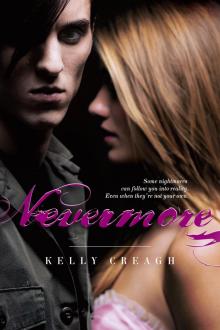- Home
- Kelly Creagh
Phantom Heart Page 12
Phantom Heart Read online
Page 12
Right along with my phone.
TWENTY-TWO
Zedok
My God. That voice. That voice.
The curse. Was it not enough?
Shall I forevermore now have that voice ringing in my hollow head as well?
I did not know where she had gone after seeing me—only that she had fled the house. For the moment, as I tore up the servants’ stairs and into her version of the attic, I told myself I did not care to where.
A black lie. But at least I could still lie to myself.
With fast footsteps, I tore across the room to the desk, where I already knew what I would find.
My music. It was gone. Of course she had taken it.
Hadn’t I known from the first notes that it had been mine? Even having never heard it with my ears, I’d have recognized it anywhere.
I fixed my hands on the desk, and before I could grasp that I had already begun to lose control, I threw it over. It landed with a deafening crash that shook the room—perhaps the whole house, though there would have been no one here to hear it.
No one but the masks.
The masks. What would they do to me now?
Wrath had seen this coming. Had there been some hint of her unearthly gift that I had ignored? Was this what Wrath had been alluding to? The reason I’d seen her face reflected in his mask and what had summoned the new masked figure who had looked so much like her?
While Stephanie might have been someone who would have caught my eye during my life before the curse, the thing that I was now could have, before today, sent her away with nary a wit. Even if she had intrigued me.
At least that was what I had been prepared to make myself believe at any cost.
But now . . . ?
The ringing of Stephanie’s voice. It had done what I had been unable to. In essence, it had ripped the mask from the truth. And now here I was, left to gaze in horror at what lay just beyond.
Stephanie. Stephanie.
How had this happened?
I replayed the events of our encounter again in my head, buying my mind another moment before having to put my realization into something so inescapable as words.
Her porcelain angel. She had discovered it in the parlor as I had intended her to. And my pressing of the piano note. That, too, had been another purposeful test, issued to see if I had yet infiltrated her mind enough to be perceived.
From there, I had followed her to the second floor and into Charlie’s bedroom with the goal of gauging what effects my tactics had thus far rendered. From there, I had meant to frighten her. But then. Then she had begun to sing. And the force, the power of her instrument had washed over me, weakening me into the unquestionable need of a chair.
The music she had woven for me on the piano, luring and lulling as it had been, was but noise next to that voice.
My very bones. They’d reverberated with her refrain. And how my hollow chest had ached from the beauty that had devastated my senses.
Rendered defenseless in her presence, incapable of departing or even moving, I had listened, transfixed. I’d not had sagacity enough even to discern that she had detected my presence. Neither had I possessed the power to shield myself in any way from the onslaught of her song. Or, for that matter, that damnable sheet!
What was I to do when she returned? After such an encounter, could I even hope she would come back?
Of course she will come back, you idiot.
And when she does, all you will want—all you might ever long for now until forever—will be to hear, to feel, those liquescent notes filling the void you have become. That angel’s voice that allowed you to taste for the first time the heaven you shall never know.
I spun to face the room that, like all of the house—both versions—served as just another chamber of my sprawling tomb.
But the accumulated clutter from all the lives the home had known could not barricade me—or insulate her, for that matter—from what would now hurry to consume us both.
Now that I knew what she was to me . . . Now that I understood what I had allowed to happen . . .
Wrath.
Was he waiting for me on the other side even now?
If he were to conquer me, would he not—would we not—then take the girl?
There would be no reasoning with myself. For, with the donning of that mask, all reason would dissolve—vanish as the day does into night.
Oh, Stephanie. Before this hour, before this day, your name had been but a collection of syllables attached to a face I had believed—perhaps in folly—that I could still have eventually forgotten. Now . . . now it was a song. One I wanted to whisper if for no other reason than its pronunciation counted as a music I could make.
I cringed beneath the mask and, with the steps of a man condemned, carried myself to the tarnished version of the chaise that sat in the parlor. Collapsing onto the seat, the one Wrath had occupied nights ago on my side of the house, I scoured my mind for a solution to this cruel twist.
But, with the first sliver of bliss I had tasted in nearly one hundred years fading, hatred, deep and dark as a mire, began to well up within my emptiness to blot out all equanimity.
The roses she had brought with her. Had the boy given them to her?
But then, who else?
I did not despise him for coming here. Nor for telling Stephanie the things he had about me. No. I hated him because he had dared to occupy a space I could never hope to. The one next to Stephanie.
I hated him almost equally for being all the things I had once been.
Handsome. Strapping. Charming. Alive.
These emotions, Envy and Spite, would both converge upon me if I could not wrest them from my consciousness.
Perhaps Madness and not Wrath would have me then.
And there would be no telling how that would end.
Stephanie. What would happen when she returned to her house?
What would happen to either of us, both of us—all of us—when I made the inevitable return to mine?
TWENTY-THREE
Stephanie
I’d texted Lucas late last night. Which was probably why he’d never texted back.
Charlie had slept beside me, tucked under the covers of my bed, this time at my behest.
After the incident in her room, I hadn’t gone back inside the house until she and Dad had returned from their battery run.
I hadn’t bothered telling Dad what had happened. He wouldn’t have believed a word of it anyway. Would the Stephanie I had been when we’d first moved into this place have believed me? Knowing Dad, he’d have put me in counseling or taken me for a head scan. Because fixing things was what Dad did. But this wasn’t something Dad would be able to fix.
Lucas, possibly, if I was lucky, might be another story. And the truth was, I’d wanted so badly to call him. I hadn’t dared, though. Because Erik had pretty much proven he could hear any conversation in the house. And if Erik could, that probably meant he could, too. That must have been why Erik wouldn’t confirm my guess that he was a prisoner, just like, I was starting to realize, my family and I were becoming.
And Erik. I’d wanted to talk to him, too. Because now there could be no denying that he was real. Still, a conversation with him would have required me to fall asleep. Something that I wasn’t sure I’d be able to do in Moldavia ever again.
Now that I was back at school, though, I was free.
Locker doors slammed and students passed me in the hall, a few giving me curious glances, probably wondering what I was doing anxiously loitering next to my own locker. If I cared, I could’ve pretended to look for something important or peruse my phone. But I couldn’t afford to miss Lucas if he decided to meet me here as I’d texted him to.
But as the hall began to clear, and Lucas’s face wasn’t among those on their way to class, my
heart began to sink.
How could someone I’d known for such a small amount of time have done so much to earn a place there? Probably because he cared. And because I, to a certain extent, had let him.
I turned my head in the direction of the thinning stairwell traffic, waiting for him to just appear, the way Erik did in my dreams. Maybe Lucas hadn’t gotten my text. Maybe he was ignoring me. Maybe he’d left his phone at home or—
“Hey, what are we looking at?” came a breathless voice from behind me. I jumped, then spun to regard Lucas, who had come from the other direction.
“Oh,” he said, straightening his short, vintage-style tie. “Sorry about that.” He smiled an involuntary smile at having accidentally startled me. That was, until he realized that I wasn’t smiling with him. His expression immediately sobered. He almost got the chance to ask me what was wrong.
Dropping my books, I collided against Lucas, wrapping my arms around him tight.
Being frightened like that. It had taken me right back to that moment in my sister’s room, when that sheet had settled over . . . over something that wasn’t supposed to be there, its whiteness conforming to the contours of a figure.
A masked figure . . .
A flush rushed to my cheeks the moment I realized I was publicly embracing Lucas Cheney. Who, so far, had yet to hug me back.
As I hurried to draw away, though, his arms settled around me, pressing me to him. For one blissful moment, I sagged against him, letting my tired eyes fall shut. His warmth engulfed me, along with the scents of sandalwood, peppermint, and soap. All of it transported me from the terror of yesterday, and this reality where I lived in a horror-filled house, to a better world. One where there was only me and Lucas.
“Something happened,” he said after a pause that I got the sense he’d wanted to prolong, his voice a rumble that I felt more than heard with one of my ears pressed to the stiff fabric of his white button-down shirt.
I nodded. Then, gripping those iron biceps, I pushed back, forcing us apart. Lucas relented, his arms hesitant but obliging. I took a breath, staring straight into the buckle of the skinny belt he wore high around his waist along with a pair of wide-legged Dagwood-style trousers.
“Sorry I missed your text,” he said. “I crashed early last night and woke up late. I didn’t see it till this morning. But, you know . . . you can always call me.”
I took in a slow, stilted breath. “I wanted to. But . . .” I trailed off, clueless on how to begin. Because the incident with the sheet sounded crazy inside my own head. Putting it into words would no doubt make it doubly so.
“It wasn’t Charlie this time, was it?” he guessed.
I shook my head, my eyes following the trail of his tie to his collar and, finally, to the unearthly blues behind those glasses.
“What was it?” he said, his gaze searching mine. “Tell me.”
Here was the moment I’d been anxious for ever since yesterday. Why should I be, though? This was Lucas, after all. The boy who waved electromagnetic-field-measuring gizmos at closets. The boy who believed in a hereafter. The boy who had been right.
“I saw him,” I said. And, because I wanted to leave no room for doubt, I uttered the name I wasn’t supposed to. “Zedok.”
TWENTY-FOUR
Zedok
In Moldavia, doorways and thresholds held, for me alone, the power to open to one version of the house or the other.
Before yesterday, I had never been selective about how I made my comings and goings between the two houses. Until yesterday, whenever I had needed to return to my Moldavia, it had been the nearest door or archway that had served best.
But after hearing Stephanie sing, the metaphorical trapdoors that surrounded me had all presented themselves as more trap than door. Because with the revelation of Stephanie’s seraphic voice, there would be no telling which of my masks would be there to greet—or ambush—me behind any one of them. Knowing what I and thus they now knew, which one of them would not rend through the other in order to lay command of me?
And so I had spent that entire night in the attic pacing—and contemplating—which doorway to step beyond.
It was true I could have bided my time indefinitely. But then, there really was no way to hide in perpetuity from oneself. And the longer I waited, the rasher, the harsher, the more restless the masks would grow. Never mind the fact that now both the girls would surely see me if I remained on their side. Perhaps I had even disturbed their sleep with my restless footsteps. What I did not need at this juncture was to give Stephanie cause—any more than I already had—to throw Erik’s cautioning to the wind and seek further assistance from that camera-toting half-wit. Doubtless, his bungling would trip the final wire upon which we all now balanced.
There was also the little matter of my current mask. Already, Languor had failed me in more ways than I wished to tally. He would need to go. There was only one mask I could think of, though, whose influence would not guarantee more bedlam. Whose strength, too, might be enough to defend us from the others—from Wrath.
If I was lucky, if Stephanie was, he still dwelled where last I had left him.
Finally obtaining a grasp on myself, I descended from the attic and exited the house by way of the back door. From there, I strode with purpose down the dawn-lit pathway of Stephanie’s world to the devastated conservatory. There, I passed through the ramshackle door of the broken glass house into the pristine but night-darkened interior of my own.
Once, long ago, the conservatory had overflowed with life. Ferns, hostas, and lilies, along with any number of other flora, had spilled from the glass doors and pivot windows.
Thanks to Myriam, during the spring and summer, roses had bloomed here in excess, their resplendence outshining lesser blooms.
This spot had been a favorite for teatime with my mother’s acquaintances. And how often had she herself sought the companionship of the blooms in order to conduct her sketching and knitting?
Only shriveled and dried blossoms remained on the vines now, their papery, freeze-dried heads held hostage by the yellowed and thorny cages of their own petrified vines.
If there was one feature I missed in my wintry Moldavia, it was the roses. But nothing here lived. Nothing save for the moths. And, perhaps, the memories tied to this glass house.
Happiness had dwelled in the conservatory once.
Now the ghost of that happiness was all that remained within its boundaries.
Of all my masks, I knew of only one who could withstand the painful recollections that haunted this place.
Against all expectation, I found him here. He stood with his back to me, a silhouette facing the windows, his gloved hands clasped behind him.
“So,” I said in a whisper. “After all this time, you are still here.”
Unlike Wrath, I had neither seen nor heard from him in decades. It must have been at least that long since I had entered this conservatory.
Knowing what part of my soul this mask represented, I had never questioned his absence when he’d first vanished. Contrariwise, I had never had the need to confirm nor seek out his presence.
Until now.
He turned to face me, revealing his mask.
Time-crackled gold affixed his nose and lips in calm, straight lines. Matching gilt-leave filigree accented this lower diamond-shaped portion of the mask by chasing the borders between it and the upper midnight-blue segment that surrounded the almond-shaped eyeholes. At his forehead, on a patch of parchment-colored paint, a few black notes dotted the lines of a music staff.
Valor.
If there was a Horatio to my Hamlet, was it not him?
As if in answer to this second and internal question, Valor removed his mask.
Perfect darkness waited within his hood.
Observing me through that void, the figure extended to me his mask in the same fas
hion Wrath had.
This time, though, as I made my way to him, I laid a hand with eagerness over my own gray mask—a mask I had stolen from Languor at some point in time that I could not now recall.
Valor watched unflinchingly on as I removed Languor’s mask, which I laid upon a plant stand beside a pair of Myriam’s discarded gardening gloves.
Accepting Valor’s from him, I placed it—both his countenance and identity—over my own.
Instantly, his figure unraveled, his cloak unfurling—vanishing—before reappearing to settle upon my own shoulders. Turning, I found my prior mask, Languor, reformed. He stood now beside the plant stand, Myriam’s gloves clenched tightly in his fist. Lost to his reverie, he paid me no mind as my free hand fell to wrap the hilt of Valor’s sheathed saber, different in ornamentation from Languor’s rapier, though no less lethal.
And so I found myself looking out through those almond-shaped eyeholes that I had, the instant before, gazed into.
Regarding the outer world, I saw and heard everything in the same manner I had in the moments before. Nothing external had changed.
Within, though—fully present now in Valor’s awareness—I was able to sense and conceive of a new course of action. One that hitherto had not occurred to me. One that would never have without Valor’s influence.
Valor and I. We would speak to Stephanie again.
And, of course, what else would Valor have me do . . . besides tell her the truth?
All of it.
TWENTY-FIVE
Stephanie
I’d never cut a class before in my life. Before today, I’d never had a reason to.
After I’d finished telling Lucas what had happened in the house yesterday, starting from the smoke detectors and ending with the sheet, the final morning bell had rung shrill through the hall, causing us both to start that time. Neither of us had laughed then.
Classroom doors had shut all around us, one teacher poking her head out into the hall to narrow her eyes on us, which prompted Lucas to gather my fallen books from the floor. He’d then taken my hand and led me wordlessly in a direction opposite my first class. I hadn’t even protested. Because, in that moment, the only thing that had mattered was that Lucas believed me.

 Nevermore
Nevermore Enshadowed
Enshadowed Oblivion
Oblivion Phantom Heart
Phantom Heart